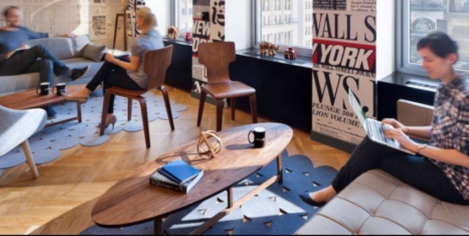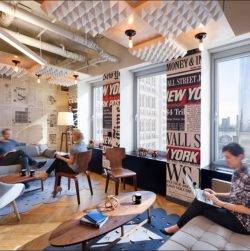January 15, 2019
Overstretched UK employees are disengaged and unproductive at work
 New research has found that over 2 million UK workers think about quitting their job every day and this figure was significantly higher amongst younger workers, aged 18-24, with 12 percent of those surveyed stating they think about this daily. The research by CABA, a charity supporting the wellbeing of chartered accountants and their families, also highlighted that 38 percent of employees regularly encountered stressful situations at work. Women were most likely to feel this way, with 41 percent revealing they deal with stressful circumstances at least once a week. Comparatively, only 34 percent of male employees admitted to encountering such situations on at least a weekly basis. Many factors were cited as contributing to employees feeling stressed, including unrealistic expectations and unmanageable workloads. Regardless of how it manifests itself within the working environment it can have a negative impact on employee wellbeing, with over 1 in 10 (12 percent) missing at least 52 family events or personal commitments each year.
New research has found that over 2 million UK workers think about quitting their job every day and this figure was significantly higher amongst younger workers, aged 18-24, with 12 percent of those surveyed stating they think about this daily. The research by CABA, a charity supporting the wellbeing of chartered accountants and their families, also highlighted that 38 percent of employees regularly encountered stressful situations at work. Women were most likely to feel this way, with 41 percent revealing they deal with stressful circumstances at least once a week. Comparatively, only 34 percent of male employees admitted to encountering such situations on at least a weekly basis. Many factors were cited as contributing to employees feeling stressed, including unrealistic expectations and unmanageable workloads. Regardless of how it manifests itself within the working environment it can have a negative impact on employee wellbeing, with over 1 in 10 (12 percent) missing at least 52 family events or personal commitments each year.











 Over half of workers (53 percent) believe that getting the right people with the right skills will be the biggest issue faced by their workplace in the year ahead. This is according to research published by Acas today, which commissioned YouGov to find out what UK employees identified as the most important workplace issues in the year ahead. The other two top issues identified were technological change (36 percent) and productivity (36 percent). Other issues identified by participants in the poll included fit and healthy staff (18 percent) and Equality and Fairness (17 percent). Acas Chief Exec, Susan Clews, said: “Employees feel that getting workers with the right skills is a key concern in the year ahead. This could be attributed to uncertainty around our relationship with the EU at the moment or general concerns around skills shortages.
Over half of workers (53 percent) believe that getting the right people with the right skills will be the biggest issue faced by their workplace in the year ahead. This is according to research published by Acas today, which commissioned YouGov to find out what UK employees identified as the most important workplace issues in the year ahead. The other two top issues identified were technological change (36 percent) and productivity (36 percent). Other issues identified by participants in the poll included fit and healthy staff (18 percent) and Equality and Fairness (17 percent). Acas Chief Exec, Susan Clews, said: “Employees feel that getting workers with the right skills is a key concern in the year ahead. This could be attributed to uncertainty around our relationship with the EU at the moment or general concerns around skills shortages.










 Flexible workers claim to work more effectively than those working a traditional ‘nine-to-five’, with a quarter of respondents (27 percent) in a recent poll saying they work longer hours in their new flexible working routine than they did when they worked normal office hours. The research, which was commissioned by the AAT (Association of Accounting Technicians) found that flexible workers think they put in almost seven hours more each week on average than they did previously. The research, which looked at the productivity of a group of workers who set their own hours or working location against a group of those who are not doing so, found that the former benefit from feeling happier and less stressed.
Flexible workers claim to work more effectively than those working a traditional ‘nine-to-five’, with a quarter of respondents (27 percent) in a recent poll saying they work longer hours in their new flexible working routine than they did when they worked normal office hours. The research, which was commissioned by the AAT (Association of Accounting Technicians) found that flexible workers think they put in almost seven hours more each week on average than they did previously. The research, which looked at the productivity of a group of workers who set their own hours or working location against a group of those who are not doing so, found that the former benefit from feeling happier and less stressed. 










January 3, 2019
Anti-team legislation can make us slaves to individual rights
by Helen Jamieson • Comment, Flexible working, Workplace
Society is becoming more selfish. At least that’s what the most commonly held view on the issue suggests, and it’s only set to get worse. Whether or not you believe the headlines, my 20 plus years’ experience as an HR consultant has led me to believe the hype. Increasingly many (I stress, not all) employees no longer see themselves as part of a team, but are increasingly ‘lone wolves’ single mindedly pursuing their needs and wants above those of the team. Each decision they make is with ‘I’ first and foremost, with ‘we’ maybe just a passing thought. It could be argued this was inevitable. How do you create a culture of team engagement, and group morale when for decades UK workplace legislation has focused almost exclusively on Individual Rights, rather than the ‘rights’ of the group? I’d argue it is simply not possible to develop successful teams where each individual has numerous legal rights but no corresponding responsibilities. My wish for 2019 would be for the government to set out a ‘responsibility’ alongside every ‘right’ it confers.
(more…)